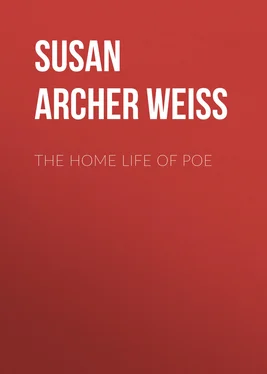Susan Archer Talley Weiss - The Home Life of Poe
Здесь есть возможность читать онлайн «Susan Archer Talley Weiss - The Home Life of Poe» — ознакомительный отрывок электронной книги совершенно бесплатно, а после прочтения отрывка купить полную версию. В некоторых случаях можно слушать аудио, скачать через торрент в формате fb2 и присутствует краткое содержание. Жанр: Биографии и Мемуары, foreign_antique, на английском языке. Описание произведения, (предисловие) а так же отзывы посетителей доступны на портале библиотеки ЛибКат.
- Название:The Home Life of Poe
- Автор:
- Жанр:
- Год:неизвестен
- ISBN:нет данных
- Рейтинг книги:4 / 5. Голосов: 1
-
Избранное:Добавить в избранное
- Отзывы:
-
Ваша оценка:
- 80
- 1
- 2
- 3
- 4
- 5
The Home Life of Poe: краткое содержание, описание и аннотация
Предлагаем к чтению аннотацию, описание, краткое содержание или предисловие (зависит от того, что написал сам автор книги «The Home Life of Poe»). Если вы не нашли необходимую информацию о книге — напишите в комментариях, мы постараемся отыскать её.
The Home Life of Poe — читать онлайн ознакомительный отрывок
Ниже представлен текст книги, разбитый по страницам. Система сохранения места последней прочитанной страницы, позволяет с удобством читать онлайн бесплатно книгу «The Home Life of Poe», без необходимости каждый раз заново искать на чём Вы остановились. Поставьте закладку, и сможете в любой момент перейти на страницу, на которой закончили чтение.
Интервал:
Закладка:
Susan Archer Talley Weiss
The Home Life of Poe
TO THE READER
In considering this book, will the reader especially note that it is not a "Life" or a "Biography" of Poe, of which too many already exist and to which nothing can be added after the exhaustive works of Woodbury and Prof. Harrison. I have not treated Poe in his character of poet or author, but confined myself to his private home-life, domestic and social, as I have heard it described by Poe's most intimate friends who knew him from infancy—some of them my own relatives—and from my own brief knowledge of him in the last three months of his life. The book may therefore be considered as a supplement to the more complete "Lives and Biographies," showing Poe in a character as yet wholly unknown to the public, but which should be known in order to enable us to form a correct judgment of his character. I have corrected various misstatements of writers which, repeated by one from another, have come to be received as truth.
I have made no attempt at producing an artistic work, but have treated the subject as it demands, in a plain and practical manner with regard to facts apart from idealism of any kind.
The Author.CHAPTER I
FIRST GLIMPSE OF EDGAR POE
It may be regarded as a somewhat curious coincidence that the first glimpse afforded us of Edgar Poe is on the authority of my own mother.
This is the story, as she told it to me:
"In the summer of 1811 there was a fine company of players in Norfolk, and we children were as a special treat taken to see them. I remember the names of Mr. Placide, Mr. Green, Mr. Young and Mr. Poe, with their wives. I can recall Mrs. Young as a large, fair woman with golden hair; but my most distinct recollection is of Mrs. Poe. She was rather small, with a round, rosy, laughing face, short dark curls and beautiful large blue eyes. Her manner was gay and saucy, and the audience was continually applauding her. She appeared to me a young girl, but was past thirty, and had been twice married.
"At this time," continued my mother, "we were living on Main street, and my uncle, Dr. Robert Butt, of the House of Burgesses, lived close by, on Burmuda street. The large, bright garret-room of his house was used by our little cousins as a play-room, and was separated from that of the adjoining house by only a wooden partition. One day, when we were playing here, we heard voices on the other side of the partition, and, peeping through a small knothole, saw two pretty children, with whom we soon made acquaintance. Mr. and Mrs. Poe had taken lodgings in this garret with a little boy and girl and an old Welsh nurse. Sometimes this woman would say to us, 'Hush, hush, dumplings, don't make a noise,' and we knew that some one was sick in that room. Most of the time she had the children out of doors, and in the evenings we would play with them on the sidewalk. The boy was a merry, romping little fellow, but hard to manage. One day, when he would persist in playing in the middle of the street, a runaway horse came dashing around a corner, and I remember how the nurse rushed toward him, screaming: 'Ho! Hedgar! Hedgar!' snatching him away at the risk of her own life.
"This nurse was a very nice old woman, plump, rosy and good-natured. She wore a huge white cap with flaring frills, and pronounced her words in a way that amused us. She was devoted to the children, who were spoiled and wilful. The little girl was running all about, and the boy appeared about three years old."
Of this old lady it may be here said that she was really the mother of Mrs. Poe, whom she called "Betty." As an actress of the name of Arnold, she had played in various companies in both this country and Europe, taking parts in which comic songs were sung. Her pretty daughter, Elizabeth, she had brought up to her own profession, and had married her early to an actor named Hopkins, who died in October, 1805. Two months after his death his widow married David Poe, who was at that time a member of their company; and mean while her mother, Mrs. Arnold, had bestowed her own hand upon a musician of the romantic name of Tubbs, who soon left her a widow. Thenceforth she devoted herself to her daughter's family, remaining with the company and occasionally appearing in some unimportant part.
When in the summer of that year of 1811 Mr. Placide's company left Norfolk to open a season in Richmond, Mr. David Poe was too ill with consumption to accompany them, and his family remained in Norfolk. He must undoubtedly have died there; for from that time in all the affairs of his family his name is not once mentioned, nor is the remotest allusion made to him. He was probably buried by the city in one of the obscure suburban cemeteries. By his death the widow was left penniless, and Mr. Placide, to whose company she still belonged, and who was anxious to have her services in his Richmond campaign, sent one of his employees to bring the family to Richmond at his own expense. A room and board had been engaged for them "at the house of a milliner named Fipps on Main street," in the low-lying district between Fifteenth and Seventeenth streets, still known as " Bird-in-hand ." This room was not by any means the wretched apartment which it has been described by some of Poe's biographers. It was not a "cellar," not even a basement room, but one back of the shop, the family residing above, and must have been comfortably furnished, for this neighborhood was at this time the shopping district of the ladies of Richmond, and Mrs. Fipps was probably a fashionable shopkeeper. Damp Mrs. Poe's room must have been, since this locality was the lowest point in the city, where, when the river overflowed its banks, as was frequently the case, the water would rise to the back doors of the Main street buildings and at times flood the ground floors. In this room Mrs. Poe contracted the malarial fever then known as "ague-and-fever," which proved fatal to her.
Owing to her illness Mrs. Poe, though her appearance was constantly advertised, did not appear on the stage more than a half dozen times, if as often. Mr. Placide wrote to her husband's relatives in Baltimore in behalf of herself and children, but received no satisfactory answer, and the company kindly gave her a benefit performance. Also, one of the Richmond papers, the " Enquirer ," of November 25th, made an appeal "to the kind-hearted of the city" in behalf of the sick actress and her little children. This brought to their aid among others Mr. John Allan and his friend, Mr. Mackenzie.
Both these gentlemen were engaged in the tobacco business, and being of Scotch nationality, the feeling of clanship led them to take a special interest in this family, whom they discovered to be of good Scotch stock. Everything possible was done for their comfort, and Mrs. Allan herself came to minister to the sick woman. On her first visit she found Mrs. Tubbs feeding the children with bread soaked in sweetened gin and water, which she called "gin-tea," and explained that it was her custom, in order to "make them strong and healthy." This was little Edgar's initiation into the habit which became the bane and ruin of his life.
It soon became evident that Mrs. Poe was very near her end. Pneumonia set in; and on the 8th of December, 1811, she died.
The question now was, what was to be done with the children? After a consultation among all parties, it was agreed that Mr. Mackenzie and Mr. Allan should take charge of them at their own homes until they should be claimed by their Baltimore relatives.
It was a sad scene when the little ones were lifted up to look their last upon the face of their dead mother, and then to be separated forever from the grandmother who had so loved and cared for them. In parting she gave to each a memento of their mother; to the boy a small water-color portrait of the latter, inscribed, "For my dear little son, Edgar, from his mother," and to the girl a jewel case, the contents of which had long since been disposed of. It was all that she had had to leave them, and with this slender inheritance in their hands the little waifs were taken away to the homes of strangers.
Читать дальшеИнтервал:
Закладка:
Похожие книги на «The Home Life of Poe»
Представляем Вашему вниманию похожие книги на «The Home Life of Poe» списком для выбора. Мы отобрали схожую по названию и смыслу литературу в надежде предоставить читателям больше вариантов отыскать новые, интересные, ещё непрочитанные произведения.
Обсуждение, отзывы о книге «The Home Life of Poe» и просто собственные мнения читателей. Оставьте ваши комментарии, напишите, что Вы думаете о произведении, его смысле или главных героях. Укажите что конкретно понравилось, а что нет, и почему Вы так считаете.












